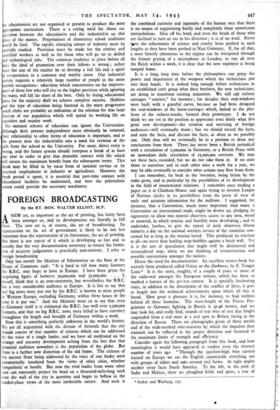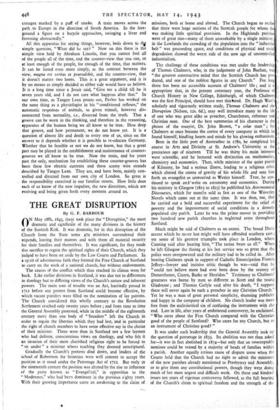FOREIGN BROADCASTING
By the RT. HON. WALTER ELLIOT, M.P.
ANEW art, as important as the art of printing, has lately been born amongst us, and its developments are literally in full blast. The new art is, of course, the art of broadcasting. Its repercussion on the art of government is likely to be not less important than the repercussion of its forerunner, the art of printing. But there is one aspect of it which is developing so fast and so secretly that the very documentation necessary to ensure the forma- tion of accurate judgements is practically non-existent. I refer to foreign broadcasting Only last month the Minister of Information on the floor of the House of Commons said: "It is hard to tell how many listeners the B.B.C. may hope to have in Europe. I have been given the surprising figure of between 20,000,000 and 35,000,000. . . . I, myself, think that is an over-statement, but nevertheless the B.B.C. has a very considerable audience in Europe. It is fair to say that any big news story put out by the B.B.C. is known to most people in Western Europe, excluding Germany, within three hours of the time it is put out." And the Minister went on to say that even in Germany itself it is estimated the B.B.C. has well over i,5o0,000 listeners, and that no big B.B.C. news story failed to have currency throughout the length and breadth of Germany within a week.
Now this is something perfectly unknown in the world's history. We are all acquainted with the dictum of Aristotle that the city should consist of that number of citizens which can be addressed by the voice of a single leader, and we have all meditated on the strange and uncanny development arising from the fact that that potential audience nowadays is the population of the globe. But there is a further new distortion of the old frame. The citizens of the ancient State being addressed by the voice of one leader were automatically insulated from the views of other cities, whether sympathetic or hostile. But now the rival leader from some other spot can constantly project his head on a thousand-mile-long neck over the wall of the city in question and begin to bellow in the market-place views of the most intolerable nature. And such is
the combined curiosity and ingenuity of the human race that there is no means of suppressing finally and completely these unwelcome interpolations. Slice off his head, and even the heads of those who are inclined to turn an ear in his direction ; it is of no avail. Never love the refinements of science and cruelty been pushed to such lengths as they have been pushed in Nazi Germany. If, for all that, a story bitterly obnoxious to the regime can be whispered through the bronze grating of a microphone in London, to run all over the Reich within a week, it is clear that the new explosive is being tamped home.
It is a long, long time before the philosophers can grasp the power and importance of the weapons which the technicians put into their hands. It is indeed long enough before technicians in an established craft grasp what their brothers, the new technicians, arc doing to transform existing industries. We still call railway carriages " coaches," for instance ; for decades their end-windows were built with a graceful curve, because so had been designed the end-windows of the horse-carriages which, lashed to the plat- form of the railway-trucks, formed their prototypes. I do not think we are yet in the position to appreciate even dimly what this great new development—the creation and servicing of foreign audiences—will eventually mean ; but we should record the facts, and state the facts, and discuss the facts, as often as we possibly can. Only thus will we eventually be in a position to draw any conclusions from them. There has never been a British periodical with a circulation of 1,5o0,000 in Germany, or a British Press with an immediate daily circulation of 25,000,000 overseas. We may see these facts recorded, but we do not take them in. If we state them to ourselves and to each other once a week for a year, we may be able eventually to consider what actions may flow from them.
I can remember, far back in the 'twenties, being bitten by the radio germ, and in particular by the possibilities of its development in the field of international relations. I remember once reading a paper on it at Chatham House, and again trying to interest League of Nations circles in its possibilities from the point of view of early and accurate information for the millions. I suggested, for instance, that a Convention, much more important than many a Convention on international trade, might be drawn up, pledging its signatories to allow two neutral observers access to any area, moral or material, in which tension and hostility were developing ; and to undertake, further, to give the report of such observers fifteen minutes a day on the national wireless service of the countries con- cerned for as long as the tension lasted. This produced no reaction at all—no more than hurling soap-bubbles against a brick wall. Yet it is the sort of speculation that might well be disinterred and reconsidered now, when we arc thinking of reconstruction and possible conventions amongst the nations.
Hence the need for documentation. An excellent source-book has recently been produced called Voices in the Darkness, by E. Tangye Lean.* It is the story, roughly, of a couple of years or more of the radio-war amongst the European nations, which has been so marked a feature of the pre;ent contest. It is specially fascinating since, in addition to the description of the conflict of ideas, it goes at length into the technical achievements upon which all this is based. How great a pleasure it is, for instance, to find realities behind all these formulae. The wave-length of the Forces Pro- gramme to Germans fighting in Russia is 42.46 metres, and we may look for, and really find, strands of real wire of just that length suspended from a real mast at a real spot in Britain facing in the direction of Russia. There are photographs given of these aerials and of the wide-meshed wire-traceries by which the impulses they transmit can be reflected in the proper direction and focussed to the maximum limits of strength and efficiency.
Consider again the following paragraph from this book, and how meaningless it would have appeared to readers even the shortest number of years ago. "Through the 350-foot-high wire curtain. trained on Europe we sec the English countryside stretching out with groups of alders and oaks around tiny farms. At right angles another array faces South America. To the left, in the path of India and Malaya, there are ploughed fields and grass, a row of
* Seeker and Warburg, 15s.
cottages marked by a puff of smoke. A train moves across the path .to Europe in the direction of South America. In the fore- ground a figure on a bicycle approaches, swinging a lever and frowning abstractedly."
All this apparatus for saying things, however, boils down to tlif simple question, " What did he say? " Now on this there is the simple view held by Abraham Lincoln, that you cannot fool all of the people all of the time, and the counter-view that you can, or at least enough of the people, for enough of the time, that matters. It can be stated even more simply, as the contrast between the view, magna est veritas et praevalebit, and the counter-view, that it doesn't matter two hoots. This is a great argument, and it is by no means as simply decided as either side would have us believe. It is a long time since a Jesuit said, " Give me a child till he is seven years old, and I do not care what happens after that." In our own time, as Tangye Lean points out, Pavlov has worked on the same thing as a physiologist in his " conditioned reflexes," the automatic responses of animals, to given stimuli, however dis- connected from normality, i.e., divorced from the 'truth. That a groove can be worn in the thinking, and therefore in the reasoning, apparatus of the human being we all know to be true. How deep that groove, and how permanent, we do not know yet It is a question of almost life and death to every one of us, since on the answer to it depends whether it is possible to re-educate Germany. Whether that be feasible or not we do not know, but that a great part may be played in the establishment and maintenance of counter- grooves we all know to be true. Now the main, and for years past the only, mechanism for establishing these counter-grooves has been these few electric currents and these scanty wire strands described by Tangye Lean. They are, and have been, mainly con- trolled and directed from our own city of London. So great is the responsibility exercised in our familiar streets. How little does each of us know of the new impulses, the new directions, which are evolving and being given forth every moment around us.



























 Previous page
Previous page